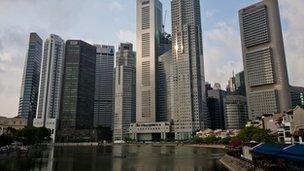Singapore steps up property curbs to bring down prices
- Published

Home prices have hit record highs in the city-state despite a slowing economy
Singapore has moved to curb its red-hot property market, hitting the share prices of its major property firms.
Shares of CapitaLand fell almost 6%, Keppel Land fell 7.5% and City Developments fell 7.3% in early trading.
Authorities have introduced higher taxes on industrial as well as residential property.
Prices have continued to rise despite a weak economy and previous government efforts to bring them down.
"We think the reaction to this set of comprehensive measures will be the most significant thus far, relative to the earlier six rounds," Barclays said in a report.
"Coupled with the large supply pipeline of public and private housing over the next few years, we think property prices will very likely stabilise, if not fall, this year."
Foreigners and firms buying residential property will now pay an increased stamp duty of 15%, up from 10%.
Authorities have also introduced, for the first time, a sellers' stamp duty of between 5% and 15% for those selling warehouses and factories within three years of purchase.
Record prices
Singapore, as well as many other Asian nations, has seen property prices rise because of moves by Western countries to make cheap credit available.
That has resulted in large amount of capital flowing into countries such as China, Hong Kong, Taiwan and Singapore, driving up prices and making housing unaffordable for many residents.
Residential prices rose to a record-high in the fourth quarter.
The government has imposed an added stamp duty for permanent residents buying their first home, and Singaporeans buying their second.
The amount of money home buyers can borrow on their second mortgage will also be tightened. And cash down payment on second loans will rise to 25% from 10%.
- Published13 November 2012
- Published12 October 2012